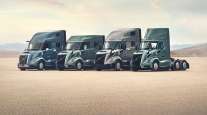Senior Reporter
California Allows Private Sales of Electricity as Motor Truck Fuel

[Stay on top of transportation news: Get TTNews in your inbox.]
Volvo Trucks North America announced it, and other industry associations and companies, helped facilitate the modification of California utility rules to give private entities the ability to sell electricity as a motor fuel at publicly accessible charging stations for medium- and heavy-duty electric vehicles.
The California Public Utilities Commission directed Southern California Edison and Pacific Gas & Electric to modify their respective Electric Rule 18 tariffs to allow this resale of electricity as a motor fuel for EVs.
Prior to this modification, California utilities were guided by a 2010 CPUC decision exempting light-duty vehicle charging station providers from being regulated as a utility, but did not explicitly exempt medium- and heavy-duty charging station providers, according to VTNA, a unit of Volvo Group.

In this episode, host Michael Freeze takes a look at the surprising ways trucking companies are building strong, resilient cultures and attracting talent that stays. Hear a snippet, above, and get the full program by going to RoadSigns.TTNews.com.
Also involved in the effort to change the rules were Volvo Low Impact Green Heavy Transport Solutions project partners Calstart, Trillium and Greenlots.
Trillium is a brand of the The Love’s Family of Cos. Greenlots is a member of Shell Group. Calstart is a nonprofit organization focused on the growth of the clean transportation technology industry.
“Building out public access charging along well-traveled corridors will enable fleet operators to pilot battery-powered trucks without having to commit significant upfront resources to construct and install charging infrastructure,” Kim Okafor, zero-emission solutions manager for Trillium, said in a release.
The decision also applies to charging service providers for off-road EVs or off-road electric equipment. San Diego Gas & Electric’s Electric Rule 18 already provided a clear exemption and did not require modification.
With the modified language, Trillium can move forward with building one of the nation’s first publicly accessible fast-charging, heavy-duty truck stations located on the border of Placentia and Anaheim, Calif. The station, scheduled to open in the fourth quarter of 2021, will enable fleet operators to recharge as needed while out on routes.
“For California to achieve its ambitious zero-emission truck and bus deployment targets, the state will need to rapidly increase charging infrastructure, and heavy-duty trucks will need both innovative depot and public charging stations,” Calstart Executive Vice President Bill Van Amburg said.
In partnership with #VolvoLights, Trillium has helped California facilitate the authorization to sell electricity as a motor fuel at publicly accessible MDHD charging stations—ensuring #EVcharging is easier and more accessible for everyone. https://t.co/dxqmqKAfLw pic.twitter.com/GTmvGGqLKi — Trillium (@TrilliumCNG) November 2, 2020
One industry observer said this was an important incremental advance.
“Yes, it’s great that electricity can now be sold by the kilowatt-hour for medium- and heavy-duty vehicles because it helps clarify the costs to charge and ensures it’s being charged more fairly. So it’s good for fleets, particularly those who would need to rely on public or shared infrastructure to charge,” Mike Roeth, executive director of the North American Council for Freight Efficiency, told Transport Topics.

Roeth
“But I don’t anticipate this alone will do much to bring down the cost of charging or dramatically accelerate buildout of public high-power charging,” he added. “My sense is grid capacity, electricity rates, tariffs — especially demand charges — and anticipated utilization rates are much more important for a site owner considering investment in charging stations to support trucks or buses.”
The latest move follows a related announcement that several West Coast electric utilities proposed a phased-in approach to electrifying Interstate 5 in an effort to reduce commercial vehicle emissions along the major freight corridor.
That proposal, released in June, recommended adding electric vehicle charging stations for freight haulers and delivery trucks at 50-mile intervals along the interstate and adjoining highways. Interstate 5 runs 1,381 miles between Canada and Mexico.
Want more news? Listen to today's daily briefing:
Subscribe: Apple Podcasts | Spotify | Amazon Alexa | Google Assistant | More




